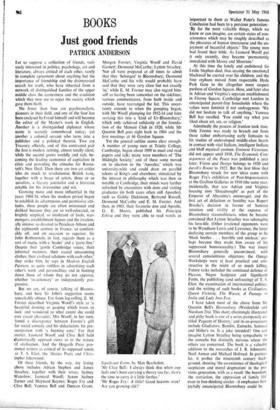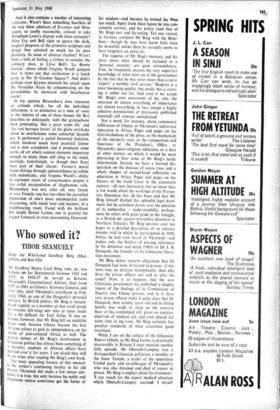Just good friends BOOKS
PATRICK ANDERSON
Let us suppose a collection of friends, vari- ously interested in politics, psychology, art and literature, always critical of each other, rarely in complete agreement about anything but the importance of friendship and the disinterested search for truth, who have inherited from a network of distinguished families of the upper middle class the earnestness and the erudition which they now use to reject the society which gave them birth.
No fewer than four are psychoanalysts, pioneers in their field, and one of the four has been analysed by Freud himself and will become the editor of the Master's work in English. Another is a distinguished diplomat whose name is scarcely remembered today; yet another a colonial servant who turns into a publisher and a political theorist. Two are Treasury officials, and of this contrasted pair the first is modest, retiring, almost totally silent, while the second grows worldly and rich, be- coming the leading economist of capitalism in crisis and providing the stimulus for Roose- velt's New Deal. Then there are two art critics vvho do much to revolutionise British taste, together with a brace of artists, three or so novelists, a literary journalist and a historian notable for his irreverence and wit.
Growing more and more influential in the years 1904-34, when the modern period began to establish its adventurous and permissive atti- tudes, these people are often mistrusted and disliked because they are so well-educated, so brightly sceptical, so intolerant of fools, war- mongers, establishment figures and the irration- ally intense, so devoted to Periclean Athens and the eighteenth century in France, so comfort- ably off, and on occasion so superior. Sir John Rothenstein, in fact, regards them as a sort of mafia, with a 'leader' and a 'party-line.'
Despite their 'gentle Cambridge voices, their informal manners, their casual unassuming clothes, their civilised relations with each other,' they strike him, he says in Modern English Painters, as quite ruthless in advertising each other's work and personalities and in hunting down those of whom they do not approve, whether 're-actionary' or independently pro- gressive.
But we are, of course, talking of Blooms- bury, and here Sir John's suggestion seems remarkably obtuse. Far from log-rolling, E. M.
Forster described Virginia Woolf's style as 'a beautiful droning or gasping which trusts to luck' and wondered to what extent she could ever create character; Mrs Woolf, in her turn, found a discrepancy between Forster's gift for social comcdy and his didacticism, his pre- occupation with 'a burning core.' For that matter, Leonard Woolf and Clive Bell held diametrically opposed views as to the nature of civilisation. And the Hogarth Press pro- moted writers as critical of its supposed tenets as T. S. Eliot, the 'thirties Poets and Chris- topher Isherwood.
Of these friends, by the way, my listing above includes Adrian Stephen and James Strachey, together with their wives; Sydney Waterlow; Leonard Woolf; Saxon Sydney Turner and Maynard Keynes; Roger Fry and Clive Bell; Vanessa Bell and Duncan Grant; Morgan Forster; Virginia Woolf and David Garnett; Desmond McCarthy; Lytton Strachey. Not all were prepared at all times to admit that they 'belonged' to Bloomsbury; Desmond McCarthy and his wife would probably have said that they were very close but not exactly 'in,' while E. M. Forster may also regard him- self as having been somewhat on the sidelines; various commentators, from both inside and outside, have rearranged the list. This uncer- tainty extends to when the grouping began, with Mr Woolf plumping for 1912-14 and later revising this into a 'kind of Ur-Bloomsbury,' which only achieved solidarity at the founda- tion of the Memoir Club in 1920, while Mr Quentin Bell goes right back to 1904 and the first meetings at 46 Gordon Square.
Yet the general outline seems clear enough. A number of young men at Trinity College, Cambridge, began about 1899 to meet and read papers and talk; many were members of 'The Midnight Society,' and of these some moved on to election to the 'Apostles,' which was university-wide and could draw on parallel talents at King's and elsewhere; stimulated by the interest in philosophy which was then so notable at Cambridge, their minds were further refreshed by encounters with dons and visiting graduates (in both cases often still Apostles), such as Goldie Dickinson, Bertrand Russell, Desmond McCarthy and E. M. Forster. And then, in 1903, their favourite don and Apostle, G. E. Moore, published his Principia Ethica and they were able to read words as Significant Form, by Max Beerbohm.
'Mr Clive Bell : I always think that when one feels one's been carrying a theory too far, then's the time to carry it a little further.'
`Mt- Roger Fry: A little? Good heavens man ! A%e you growing old?' important to them as Walter Pater's famous Conclusion had been to a previous generation: 'By far the most valuable things, which we know or can imagine, are certain states of con- sciousness which may be roughly described as the pleasures of human intercourse and the en- joyment of beautiful objects.' The young men had found their bible. As Leonard Woolf put it only recently, they became 'permanently inoculated with Moore and Moorism.'
At this time the lonely and embittered Sir Leslie Stephen died, thus ceasing the emotional blackmail he exerted over his children, and the four orphans moved from respectable Hyde Park Gate to the altogether more suspect purlieus of Gordon Square. Here, and later also in Adrian and Virginia's separate establishment in Fitzroy Square, Cambridge met London in emancipated parent-free households where the values were feminist if not androgynous. 'We did not hesitate to talk of anything,' Vanessa Bell has recalled. 'You could say what you liked about art, sex, or religion.
Admittedly the process of fruition took time. Only Forster was ready to branch out from those rather embarrassing early fantasies to his studies of undeveloped middle-class hearts in contact with vital Italians, intelligent Indians and bluff mystical yeomen. Eminent Victorians did not appear until 1918, The Economic Con- sequences of the Peace was published a year later; Vision and Design belongs to 1920 and Jacob's Room to 1922. But the first blow that Bloomsbury struck for • new ideas came with Roger Fry's exhibition of Post-Impressionists at the Grafton Galleries in 1910 (the same year, incidentally, that , saw Adrian and Virginia hoaxing fats 'Dreadnought' as part of the Emperor of Abyssinia's entourage), and the first act of defection or hostility was Rupert Brooke's decision in favour of Samoan intuition and virility at the expense of Bloomsbury reasonableness, when he became convinced that Lytton Strachey was sabotaging his love-life. (Other irrational opponents were to be Wyndham Lewis and Lawrence, the latter declaring certain members of the group to be `black beetles . . . horrible and unclean,' per- haps because they made him aware of his suppressed homosexuality.) The war found Bloomsbury generally unconvinced, with several conscientious objectors; the Omega Workshops were at least practical and con- structive in the midst of so much killing. Future tasks included the continued defence of Picasso, Negro Sculpture and Significant Form, the publishing (and unfreezing) of T. S. Eliot, the examination of international politics, and the writing of such books as Civilisation, Queen Victoria, The Waves, A Passage to India and Lady Into Fox.
I have taken most of the above from Mr Quentin Bell's Bloomsbury (Weidenfeld and Nicolson 21s). This short, charmingly illustrated and pithy book is one of a series pompously en- titled 'Pageant of History,' and its co-processors include Gladiators, Bandits, Eunuchs, Samurai and Hitler's ss. Is a joke intended? One can imagine Lytton Strachey being sympathetic to the eunuchs but distinctly nervous where the others are concerned. The book is a valuable addition to the researches of J. R. Johnstone, Noel Annan and Michael Holroyd. In particu- lar, it probes the nineteenth century back- ground, showing 'the co-existence of theological scepticism and moral dogmatism' in the pre- vious generation, with as a result 'the boredom. the restriction, the oppression of family life' even in free-thinking circles—it emphasises how joyfully emancipated Bloomsbury could be. And it also. contains a number of.intere,sting. criticisms. Wasn't there something heartless in the way these admirers of Erasmus and Mon- taigne, so coolly reasonable, refused to take Wyndham Lewis's dispute with them seriously? Were Fry and Bell right to ignore the dark, magical purposes of the primitive sculpture and design they admired so much for its pure plasticity, its sense of abstract rhythm? Wasn't there a lack of feeling, a failure to consider the ordinary man, in Clive Bell's `La Bonne Societe,' about which Virginia Woolf quipped that it turns out that civilisation is a lunch party at No 50 Gordon Square'? And didn't perhaps even Keynes diminish his attack upon the Versailles Peace by concentrating on the personalities he showered with Stracheyian scorn?
In my opinion Bloomsbury does represent an attitude which, for all the individual differences, is as distinctive as-a tone of voice or the interior of one of those houses Mr Bell describes so deliciously, with the gramophone horn protruding 'like a great arum lily' and 'the vast baroque leaves' of the globe artichoke about to overbalance some colourful Spanish pot. It performed a useful historical function, which involved much hard practical labour and is now completed, and it produced some works of art which contain elements important enough to make them still cling to the mind, teasingly, tantalisingly, as though their flaws were part of their charm: Forster's moral vision driving through spinsterishness to collide with melodrama, and Virginia Woolf's ability to represent states of consciousness despite a too artful manipulation of diaphanous veils. Bloomsbury was not, after all, very Greek or very French; one has too often the parochial impression of one's more emancipated aunts discoursing, with much tone and manner, in a neighbouring room. Faced with the brilliant but deeply flawed Lytton, one is grateful for rugged Leonard or even unassuming Desmond.







































 Previous page
Previous page